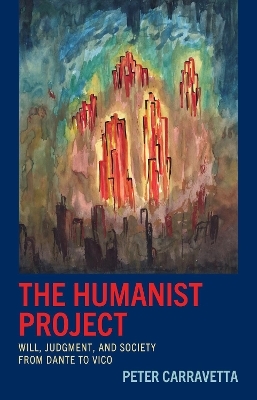
The Humanist Project
Will, Judgment, and Society from Dante to Vico
Seiten
2024
Lexington Books/Fortress Academic (Verlag)
978-1-6669-2036-9 (ISBN)
Lexington Books/Fortress Academic (Verlag)
978-1-6669-2036-9 (ISBN)
Engaging post- and trans-humanist critiques, Carravetta searches the tradition to recover the key notions of free will, judgment, and emblematic projections of the ideal society. From Dante through Vico, compelling existential, ethical, and sociopolitical perspectives are applied to our modern society.
Humanistic studies has been subjected to critiques from the inside of the university disciplines and shrinking support structures on the outside; moreover, recent technological developments have trapped humans in the maws of the information machine, where will, agency, and dialogue are constantly stunted and mediated, disclosing a nihilistic, dilated present. Against this panorama, Peter Carravetta argues that there is a need to recover the “human” in humanistic reflection, here described as a free social, creative, yet elusive being, caught between idealizations (utopias, concepts of society, autonomy of powers), the realities of survival (basic economics and geographies), and the dynamics of power (the languages and the praxis of actually running the society). The Humanist Project: Will, Judgment, and Society from Dante to Vico presents Dante as the first true humanist, with his stressing the preeminence of free will and individual responsibility in the life of the polis; Boccaccio’s later encyclopedic works as a philosophy of existence and history; Pico della Mirandola’s autopoiesis of the thinking and acting human in light of recent theories of interpretation, the self, and society; Machiavelli and the challenge of chance in determining sociohistorical patterns; Campanella as the last true utopic writer and first to conceive of a realist, world-scale political vision; and Vico as the thinker who identifies and describes the dialectic between historical recurrences and the free will of the individual.
Humanistic studies has been subjected to critiques from the inside of the university disciplines and shrinking support structures on the outside; moreover, recent technological developments have trapped humans in the maws of the information machine, where will, agency, and dialogue are constantly stunted and mediated, disclosing a nihilistic, dilated present. Against this panorama, Peter Carravetta argues that there is a need to recover the “human” in humanistic reflection, here described as a free social, creative, yet elusive being, caught between idealizations (utopias, concepts of society, autonomy of powers), the realities of survival (basic economics and geographies), and the dynamics of power (the languages and the praxis of actually running the society). The Humanist Project: Will, Judgment, and Society from Dante to Vico presents Dante as the first true humanist, with his stressing the preeminence of free will and individual responsibility in the life of the polis; Boccaccio’s later encyclopedic works as a philosophy of existence and history; Pico della Mirandola’s autopoiesis of the thinking and acting human in light of recent theories of interpretation, the self, and society; Machiavelli and the challenge of chance in determining sociohistorical patterns; Campanella as the last true utopic writer and first to conceive of a realist, world-scale political vision; and Vico as the thinker who identifies and describes the dialectic between historical recurrences and the free will of the individual.
Peter Carravetta is professor of philosophy at SUNY Stony Brook.
Preface
Acknowledgments
Introduction: Humanism at the End of the “Human”
Chapter One: Dante: Poetics of Judgment and Birth of Humanism
Chapter Two: Boccaccio: Contingency, Myth, History
Chapter Three: Pico: The Hermeneutics of the Human Project
Chapter Four: Machiavelli: Discourse, Will, Social Change
Chapter Five: Agricola to Ramus: Rhetoric of Method
Chapter Six: Campanella: The Human Project Between Utopia and Realpolitik
Chapter Seven: Vico: The Resilience of the Human
Conclusion
| Erscheinungsdatum | 14.05.2024 |
|---|---|
| Sprache | englisch |
| Maße | 160 x 236 mm |
| Gewicht | 572 g |
| Themenwelt | Geisteswissenschaften ► Philosophie ► Geschichte der Philosophie |
| Geisteswissenschaften ► Religion / Theologie | |
| ISBN-10 | 1-6669-2036-3 / 1666920363 |
| ISBN-13 | 978-1-6669-2036-9 / 9781666920369 |
| Zustand | Neuware |
| Haben Sie eine Frage zum Produkt? |
Mehr entdecken
aus dem Bereich
aus dem Bereich
die kolonialen Wurzeln der französischen Theorie
Buch | Hardcover (2024)
Matthes & Seitz Berlin (Verlag)
28,00 €
oder Das Leben Montaignes in einer Frage und zwanzig Antworten
Buch | Softcover (2023)
C.H.Beck (Verlag)
18,00 €


